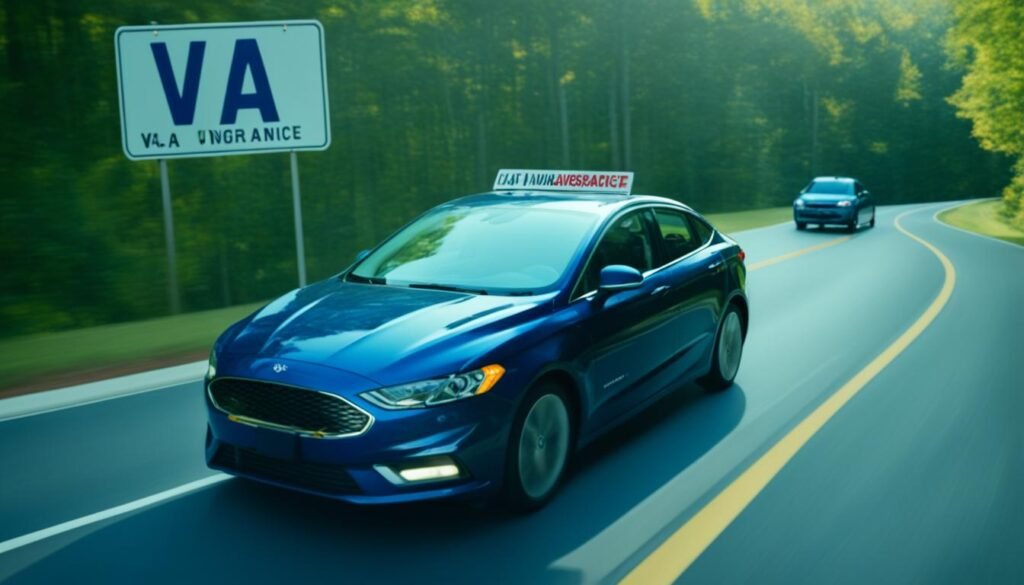In Virginia, it’s crucial for drivers to know the state’s auto insurance rules. All vehicle owners must have liability car insurance. Starting July 1, 2024, paying the Uninsured Motor Vehicle Fee instead of liability insurance will not be an option. This change is a big deal for Virginia’s auto insurance laws.
Before July 1, 2024, drivers could pay a $500 fee if they didn’t have liability insurance. This meant they could drive without insurance but would be personally responsible for any accidents. Now, with the new law, all drivers must have the state’s minimum liability insurance.
Key Takeaways
- Virginia will transition to a mandatory auto insurance state starting July 1, 2024.
- The minimum liability car insurance requirements in Virginia are $30,000 in bodily injury or death coverage for one person, $60,000 for total bodily injury or death, and $20,000 for property damage per accident.
- Uninsured motorist coverage is also mandatory in Virginia, with the same minimum requirements as liability coverage.
- Penalties for driving without car insurance in Virginia can include suspension of driving privileges, suspension of vehicle registration, a $600 non-compliance fee, and the need to file an SR-22 form for three years.
- Virginia drivers are advised to shop around for car insurance policies to find the best rates and coverage options.
Mandatory Auto Insurance in Virginia
Virginia’s financial responsibility law makes sure drivers can pay for losses from their vehicles. You need a policy with a minimum of $30,000 for one person’s injury or death. For two or more people, it’s $60,000. And $20,000 for damage to property.
Liability Coverage Requirements
The state’s virginia auto insurance liability coverage covers bodily injury and property damage. You must have at least $25,000 for one person and $50,000 for an accident. Plus, $20,000 for property damage. These rules ensure drivers are responsible and can pay for accidents.
Uninsured/Underinsured Motorist Coverage
Virginia uninsured underinsured motorist coverage offers extra protection. Uninsured Motorist (UM) coverage helps with accidents from drivers without insurance or who leave the scene. Underinsured Motorist (UIM) coverage kicks in if the other driver’s insurance doesn’t cover your damages.
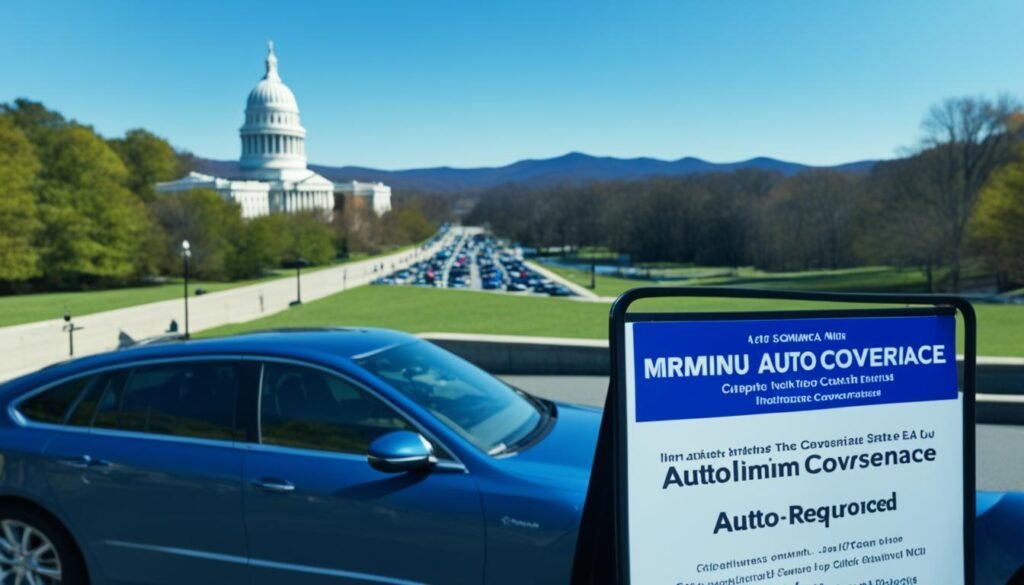
“If you are in an accident caused by an uninsured or underinsured driver, your UM/UIM coverage can help pay for your medical expenses and property damage.”
virginia auto insurance requirements
In Virginia, all vehicle owners must have car insurance or pay a $500 UMV fee yearly. The minimum coverage limits are $30,000 for bodily injury per person, $60,000 for total bodily injury, and $20,000 for property damage. These limits will increase on January 1, 2025, to $50,000 for bodily injury per person, $100,000 for total bodily injury, and $25,000 for property damage.
Drivers must show proof of insurance and have it ready for police. Not having the required virginia car insurance can lead to fines, fees, and losing your license and vehicle registration.
| Coverage Type | Minimum Limits (2022-2024) | Minimum Limits (2025+) |
|---|---|---|
| Bodily Injury Liability | $30,000 per person / $60,000 per incident | $50,000 per person / $100,000 per incident |
| Property Damage Liability | $20,000 | $25,000 |
Drivers in Virginia need to know about virginia state auto insurance laws and what happens if they don’t have insurance. It’s key to understand the virginia car insurance requirements for legal and financial safety on the road.
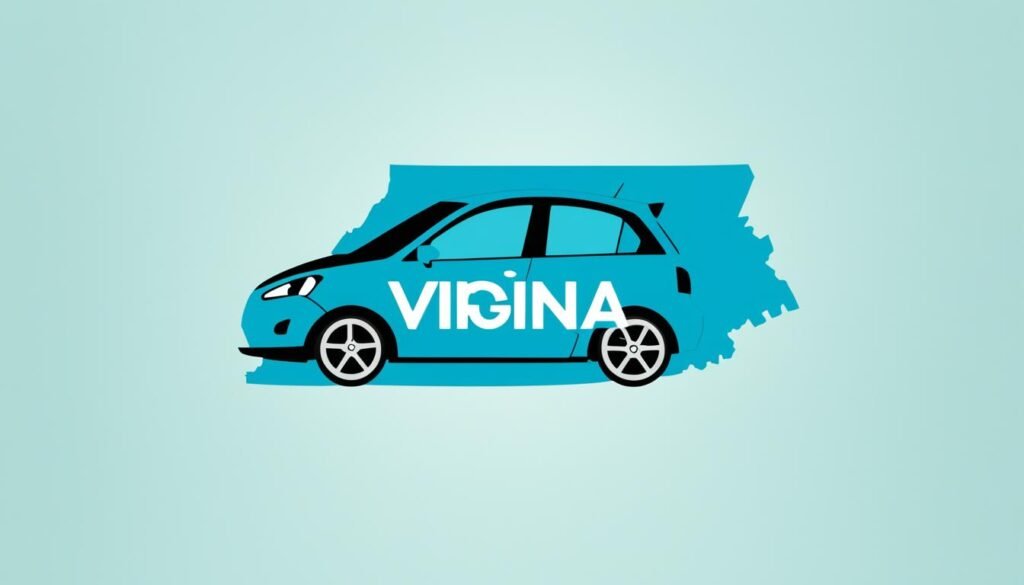
“Maintaining the proper auto insurance coverage in Virginia is not just a legal requirement, but a vital safeguard for drivers and their vehicles.”
Consequences of Driving Uninsured
Driving without car insurance in Virginia is illegal. If you don’t follow state rules. You’ll lose your driving and vehicle registration rights. To get them back, you must pay a $600 non-compliance fee.
You also need to file a Financial Responsibility Insurance Certificate (SR-22) with DMV for three years. And, you’ll have to pay a $145 reinstatement fee. Some drivers can pay the fee over time through a Payment Plan Program.
Penalties and Fees
Driving without insurance in Virginia has big consequences. You’ll face a $600 non-compliance fee. You’ll also need an SR-22 insurance certificate for three years and a $145 reinstatement fee.
Your license and vehicle registration may be suspended until you show proof of insurance.
License and Registration Suspension
If you don’t have the minimum liability coverage in Virginia, your driver’s license and vehicle registration can be suspended. To get them back, you must pay the fees. You’ll also need to file an SR-22 form and show proof of insurance.
| Penalty | Details |
|---|---|
| Non-compliance fee | $600 |
| SR-22 requirement | 3 years |
| Reinstatement fee | $145 |
Driving without insurance in Virginia can cause big financial and legal problems. It’s key to keep the minimum liability coverage to protect yourself and others.
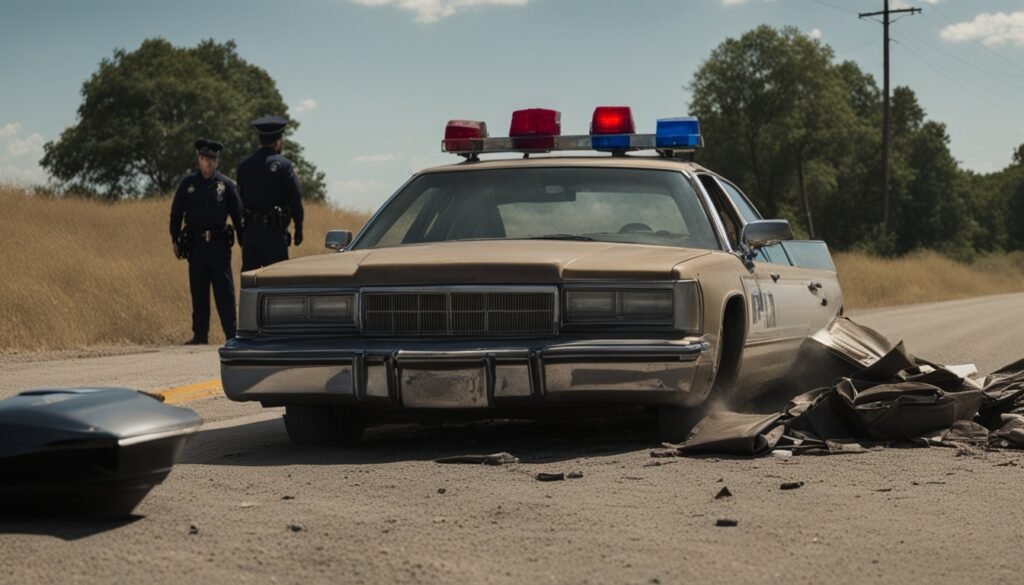
Optional Insurance Coverages
Virginia drivers must have basic insurance, but many choose more coverage for better protection. Collision and comprehensive insurance are two common extras.
Collision and Comprehensive Coverage
Collision coverage pays for fixing your car if it gets damaged in an accident, no matter who caused it. Comprehensive coverage covers damage from things not related to a crash, like theft, vandalism, or natural disasters.
These optional car insurance coverages in Virginia are often needed if you lease or finance your car. They give you extra protection beyond the state’s basic insurance limits for virginia collision and comprehensive coverage.
| Coverage Type | What It Protects |
|---|---|
| Collision | Damage to your vehicle after a collision, regardless of fault |
| Comprehensive | Damage to your vehicle from non-collision events like theft, vandalism, or natural disasters |
With the high costs of fixing or replacing a car, optional car insurance coverages in Virginia like collision and comprehensive are very useful. They offer financial protection beyond what’s required by the state.
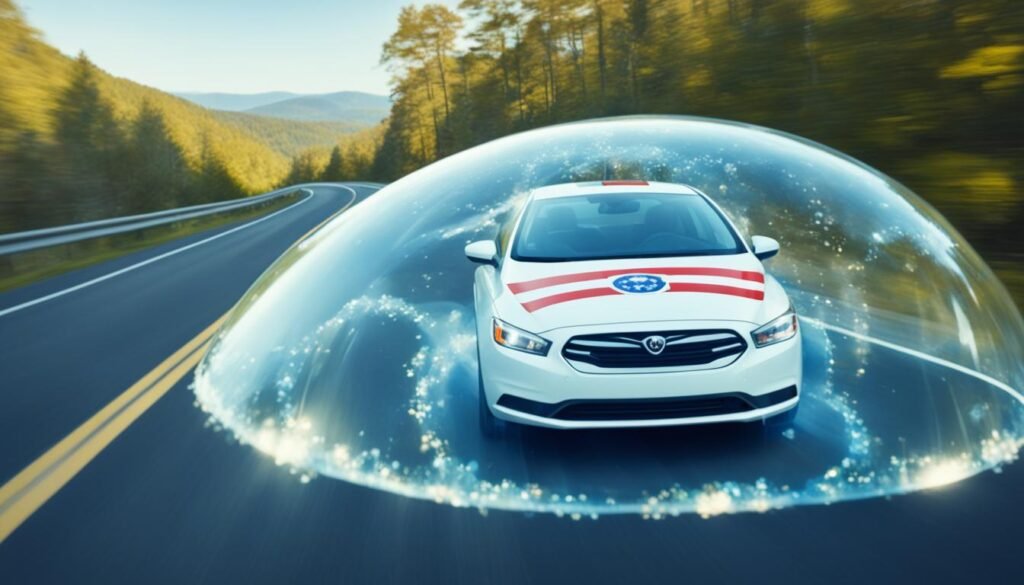
Factors Affecting Your Rates
When figuring out auto insurance costs in Virginia, many things come into play. These include your age, gender, credit score, and how much you drive. Also, the type of car you drive and if it has safety features like anti-theft devices or airbags matter. You might get discounts if you share info about your driving habits or if you’re a student or drive less.
Having a clean driving record and no accidents usually means lower insurance costs. But, getting into an accident can raise your rates more than getting a speeding ticket. DUIs can lead to big rate hikes or even make it hard to get insurance.
Having insurance before can show you’re a responsible driver and might lower your rates. Credit scores play a big part in insurance costs, and a lower score means higher premiums. In some places, your credit history affects how much you pay for insurance.
Where you live also changes your insurance rates. Each state has its own rules for insurance. Men often pay more because they’re more likely to speed or drive under the influence. New cars cost more to insure because they have the latest tech and parts. And, older drivers often pay more too.
“An increase in incidents from other drivers in the same risk group can impact your rates.”
Virginia has seen more car accidents, which has raised insurance costs. Cities like Richmond and Virginia Beach have more accidents because of heavy traffic. Rural areas see more accidents too, thanks to higher speeds and less police.
| Factor | Impact on Rates |
|---|---|
| Driving Record | Drivers with clean records get the cheapest rates, while at-fault accidents and severe infractions like DUI lead to significant increases. |
| Credit Score | Lower credit scores usually result in higher premiums. |
| Vehicle Type | Newer vehicles with advanced technology and expensive parts cost more to insure. |
| Age | Young and elderly drivers tend to have higher premiums. |
| Location | Urban areas with more accidents see higher rates, while rural areas are also affected by higher speeds and less enforcement. |
Figuring out Virginia auto insurance costs is complex. It looks at many factors that affect car insurance rates in virginia. It’s a good idea to compare quotes from different companies to find the best deal for you.
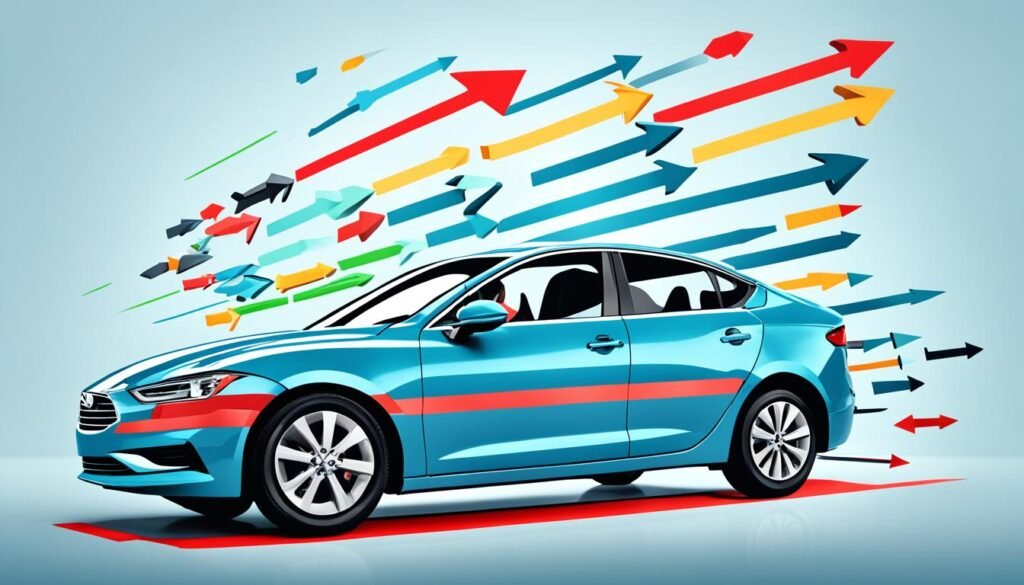
Obtaining Proof of Insurance
In Virginia, it’s key to always carry proof of your auto insurance. Insurance companies must tell the Virginia DMV when a policy starts or ends for a registered vehicle. If the DMV says your vehicle isn’t insured, you’ll get a warning. You must show proof of insurance to avoid fines.
To prove you have auto insurance in Virginia, ask for a policy copy or an insurance ID card from your provider. Keep this in your car, as you might need to show it during a traffic stop or at the DMV.
The Virginia DMV also offers an online tool to check your vehicle’s insurance status. This helps you make sure your coverage is current and meets state rules.
| How to Get Proof of Auto Insurance in Virginia |
|---|
|
Remember, having valid auto insurance and proof of it is a must in Virginia. Keep your insurance up to date and have the documents ready. This way, you avoid fines and penalties for driving without proof.
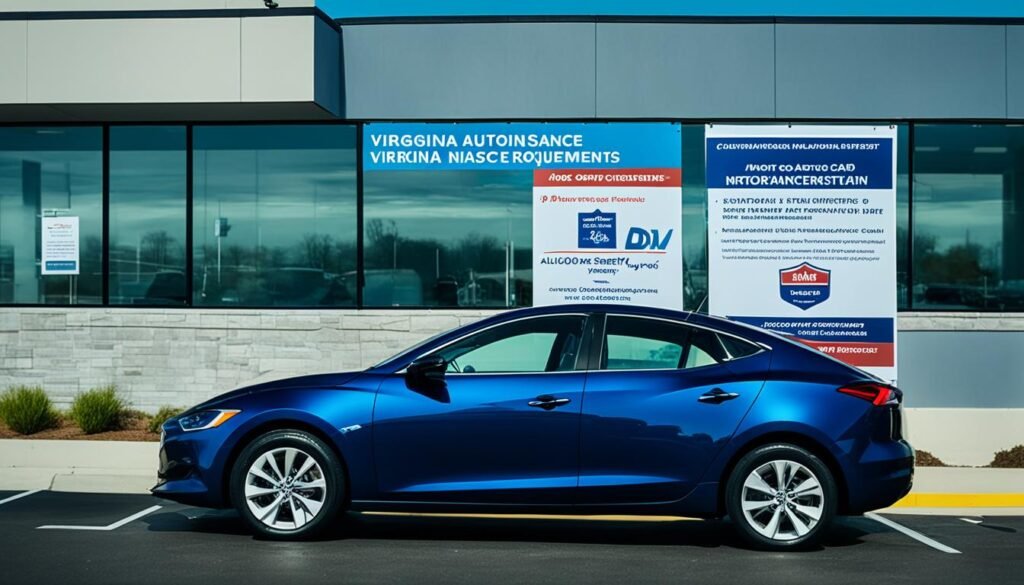
“Driving without insurance in Virginia can lead to serious consequences, including license and registration suspension. It’s crucial to always have proof of your coverage readily available.”
No-Fault vs At-Fault State
Virginia is an at-fault state for car insurance. This means the driver who causes an accident is responsible for the damages and injuries. The driver must go through a legal process to figure out who is at fault.
Under Virginia’s at-fault laws, drivers must report accidents that cause damage, injury, or death. You have two years to file a personal injury claim after an accident. For wrongful death claims, you have two years from when the person passed away. It’s crucial to know about at-fault insurance rules and the legal steps after a car accident in Virginia.
More than 10% of drivers in Virginia might not have enough insurance. So, having comprehensive and collision coverage is key to protect your finances. If an accident is caused by an uninsured or underinsured driver, you can claim with your insurance, sue the at-fault driver, or file a claim against their insurance.
“The recovery of damages for losses and injuries post-accident is influenced by understanding Virginia’s fault-based insurance laws.”
Rutter Mills has over 50 years of experience in personal injury cases. They know how to handle Virginia’s at-fault insurance laws. They can help those affected by car accidents in the state.
New Virginia Car Insurance Law
Starting July 1, 2023, Virginia has a new law for uninsured motorist (UM) and underinsured motorist (UIM) coverage. This law aims to protect drivers more in accidents with uninsured or underinsured drivers.
Before, UM/UIM coverage paid out only if it was more than the at-fault driver’s insurance. Now, with the virginia new car insurance law 2023, drivers can stack their UM/UIM coverage on top of the at-fault driver’s insurance. This means drivers could get more insurance money in an accident with an underinsured driver.
The changes to uninsured underinsured motorist coverage in virginia help reduce the financial stress on drivers hit by uninsured or underinsured motorists. This new law gives drivers more coverage, making sure they get the help they need after such accidents.
The virginia new car insurance law 2023 is a big step up for auto insurance in Virginia. It’s helping to tackle the problem of uninsured drivers. These updates to UM/UIM coverage are a key safety net for everyone driving in Virginia.
“The new law provides much-needed relief for Virginia drivers who have been victimized by uninsured or underinsured motorists in the past. This is a positive change that will help ensure they are appropriately compensated.”
Conclusion
Virginia’s auto insurance rules make sure drivers have basic financial protection after an accident. The state requires a minimum amount of liability coverage. This ensures drivers can pay for damages and medical bills if they cause an accident. But, many drivers in Virginia buy more coverage for better protection.
It’s important to know about Virginia’s car insurance laws. Drivers need to understand the state’s minimum liability limits. They should also know the risks of driving without insurance and the extra coverage options available. Reviewing insurance policies often helps drivers make sure they’re covered right.
By being informed and making smart choices about insurance, Virginia drivers can follow the state’s insurance laws. This helps keep everyone safe on the roads. For more info on Virginia’s car insurance rules or to find affordable options in Richmond, drivers can talk to local insurance companies or legal experts.
Learn more about Virginia’s car insurance or check out affordable car insurance options in Richmond.
FAQ
What are the mandatory auto insurance requirements in Virginia?
What are the penalties for driving without insurance in Virginia?
What types of optional insurance coverage are available in Virginia?
What factors can affect car insurance rates in Virginia?
How can I obtain proof of insurance in Virginia?
Is Virginia a no-fault or at-fault state for car insurance?
What are the changes to uninsured/underinsured motorist coverage in Virginia?
Source Links
- Virginia Car Insurance Requirements
- Virginia Car Insurance Laws Are Changing July 1: Here’s What You Need To Know | Bankrate
- Drivers in Virginia will be required to have car insurance by July 1
- Virginia Car Insurance Laws | Bankrate
- Do You Need to Get Car Insurance in Virginia?
- Virginia Car Insurance Coverage – Nationwide
- All Virginia drivers must have car insurance by July 1 as state drops uninsured fee
- Uninsured Driver Penalties in Virginia | Pendleton Law Team
- Driving Without Insurance in Virginia | Bankrate
- Driving Without Insurance in Virginia | AutoInsurance.com


